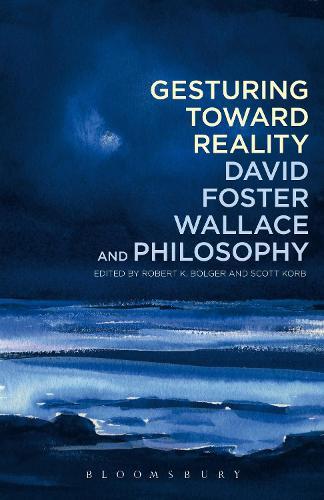Overview
Asked in 2006 about the philosophical nature of his fiction, the late American writer David Foster Wallace replied, ""If some people read my fiction and see it as fundamentally about philosophical ideas, what it probably means is that these are pieces where the characters are not as alive and interesting as I meant them to be."" Gesturing Toward Reality looks into this quality of Wallace's work—when the writer dons the philosopher's cap—and sees something else. With essays offering a careful perusal of Wallace's extensive and heavily annotated self-help library, re-considerations of Wittgenstein's influence on his fiction, and serious explorations into the moral and spiritual landscape where Wallace lived and wrote, this collection offers a perspective on Wallace that even he was not always ready to see. Since so much has been said in specifically literary circles about Wallace's philosophical acumen, it seems natural to have those with an interest in both philosophy and Wallace's writing address how these two areas come together.
Full Product Details
Author: Dr. Robert K. Bolger , Professor Scott Korb
Publisher: Bloomsbury Publishing Plc
Imprint: Bloomsbury Academic USA
Dimensions:
Width: 14.00cm
, Height: 2.30cm
, Length: 21.60cm
Weight: 0.345kg
ISBN: 9781441162656
ISBN 10: 1441162658
Pages: 296
Publication Date: 14 August 2014
Audience:
College/higher education
,
Postgraduate, Research & Scholarly
Format: Paperback
Publisher's Status: Active
Availability: Manufactured on demand 
We will order this item for you from a manufactured on demand supplier.
Language: English
Table of Contents
Acknowledgements Notes on Contributors Introduction Scott Korb, New York University, USA Chapter One. How We Ought To Do Things With Words Alexis Burgess, Stanford University, USA Chapter Two. The Subsurface Unity of All Things, Or David Foster Wallace’s Free Will Leland de la Durantaye, Claremont McKenna College, USA Chapter Three. A Less ‘Bullshitty’ Way To Live: The Pragmatic Spirituality of David Foster Wallace Robert K. Bolger, USA Chapter Four. This is Water and Religious Self-Deception Kevin Timpe, Northwest Nazarene University, USA Chapter Five. Inside David Foster Wallace’s Head: Attention, Loneliness, Suicide and the Other Side of Boredom Andrew Bennett, University of Bristol, United Kingdom Chapter Six. The Lobster Considered Robert C. Jones, California State University, Chico, USA Chapter Seven. The Terrible Master: David Foster Wallace and the Suffering of Consciousness (with Guest Arthur Schopenhauer) Blakey Vermeule, Stanford University, USA Chapter Eight. Philosophy, Self-Help and the Death of David Wallace Maria Bustillos, USA Chapter Nine. Untrendy Problems: The Pale King’s Philosophical Inspirations Jon Baskin, University of Chicago, USA Chapter Ten. The Formative Philosophical Influences of David Foster Wallace With Special Reference to The Broom of the System Tom Tracey, United Kingdom Chapter Eleven. Beyond Philosophy: David Foster Wallace and the Dangers of Theorizing Randy Ramal, Claremont Graduate University, USA Chapter Twelve. Good Faith and Sincerity: Sartrean Virtues of Self-Becoming in David Foster Wallace’s Infinite Jest Allard den Dulk, Amsterdam University College, Netherlands Chapter Thirteen. Theories of Everything and More: Infinity Is Not The End Ryan David Mullins, University of Bonn, Germany Chapter Fourteen. Does Language Fail Us? Wallace’s Struggle with Solipsism Patrick Horn, Azusa Pacific University, USA Index
Reviews
Wallace's deeply influential postmodern pragmatism was not the casual by product of his novelistic vision. Rather, it was the distillation of a lifetime of urgent and rigorous philosophical engagement. Unfortunately, that deeply informed background is often obscured by the white light of his intimate, inimitable voice. Gesturing Toward Reality refracts that light to reveal the colorful spectrum of his sources. The essays assembled here are as lively as they are entertaining, and provide an accessible introduction to some of the most complex ideas in Wallace's already challenging oeuvre . -- Marshall Boswell, Professor and Chair of English, Rhodes College, USA, author of Understanding David Foster Wallace, and co-editor of David Foster Wallace and The Long Thing
Wallace's deeply influential postmodern pragmatism was not the casual by product of his novelistic vision. Rather, it was the distillation of a lifetime of urgent and rigorous philosophical engagement. Unfortunately, that deeply informed background is often obscured by the white light of his intimate, inimitable voice. Gesturing Toward Reality refracts that light to reveal the colorful spectrum of his sources. The essays assembled here are as lively as they are entertaining, and provide an accessible introduction to some of the most complex ideas in Wallace's already challenging oeuvre . -- Marshall Boswell, Professor and Chair of English, Rhodes College, USA, author of Understanding David Foster Wallace, and co-editor of David Foster Wallace and The Long Thing Gesturing Toward Reality is the first collection of pieces on David Foster Wallace to tackle head-on one of the things that make his work so important to so many: the power of his thinking. Approaching Wallace's thinking from a variety of angles, the philosophers and literary critics in this volume work hard (and to great effect) to tease out Wallace's ideas as they appear in his fiction and nonfiction, to explore how he came to them from his education and experience, how he expressed them through language, and what they meant for him and might continue to mean to us; Gesturing Toward Reality thus makes a significant contribution not only to Wallace studies but to the work of anyone interested in literature and philosophy, in the way we tell stories in order to think. -- Samuel Cohen, Associate Professor of English, University of Missouri, USA
Author Information
Robert K. Bolger (Ph.D., Claremont Graduate University, USA) is the author of Kneeling at the Altar of Science: The Mistaken Path of Contemporary Religious Scientism. Scott Korb teaches writing at New York University, the New School, and in Pacific University’s MFA program (all USA). His books include The Faith Between Us, Life in Year One, and Light without Fire.
Tab Content 6
Author Website:
Customer Reviews
Recent Reviews
No review item found!
Add your own review!
Countries Available
All regions
|




